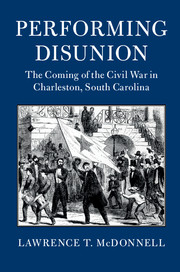12 - The Soul of Chivalry
from CONTRADICTIONS: STAND NOBLY TOGETHER
Published online by Cambridge University Press: 08 June 2018
Summary
Charleston, of course, claimed Paul Morphy for its own. His father and uncle had lived in the Queen City at the start of the century, and many accounts christened the champion a Charlestonian. Where else would the “chivalrous Bayard of chess” hail from? As word of Morphy's exploits filtered back to America, a “deliberate and well considered movement of some young citizens” created the Charleston Chess Club. They took rooms at 221 King Street, over Van Schaak and Grierson's drug store, between the photographic studio of Osborn and Durbec and Charlton Bird's store, where the blue cockade would soon be sold, four doors down from Walter Steele's hat shop. In counting houses along the East Bay and in the lobby of the Mills House, at militia meetings, and in fire halls, men squared off over checkered boards. Here, perhaps more than anywhere, Morphy and Edge had unleashed a chess “revolution.”
Revolution? Revelation of hidden identities was the melodramatic heart of recreation in Victorian culture. Silly, sportive, alternative, sometimes truer selves came briefly to the fore, and that was the fun of the game. In this sense, the simplest charades or guessing games contained a revolutionary element, abruptly subverting cultural imperatives of self- discipline and emotional restraint. Just so, conversely, disunionist serenades, speechifying, and parades by groups like the Young Men's Secessionist Association (YMSA) were at heart partial and playful steps toward revolution. Yet there were boundaries even those games balked at crossing, identities they feared to perform. 3 In Charleston, chess – the great game of perception – plunged onward, silently but directly linking play and transgressive masculinity as no other pastime dared. In a community threatened both by the advent of an emasculating capitalism and a feminizing wave of reform, the royal game became far more than a pleasant, idle pastime. On the liminal space of a very small board, chess put men back in the saddle, in dangerous, new ways.
Elite men had already found a strange path to the same place. One reason “chess mania” never seemed so odd to Charlestonians was that talk of castles and kings, knights and tournaments already abounded in South Carolina, describing a far more extravagant sort of spectacle.
- Type
- Chapter
- Information
- Performing DisunionThe Coming of the Civil War in Charleston, South Carolina, pp. 244 - 270Publisher: Cambridge University PressPrint publication year: 2018



